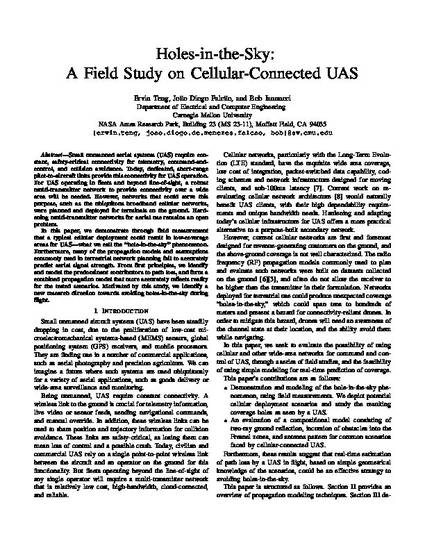
Article
Holes-in-the-Sky: A Field Study on Cellular-Connected UAS
2017 International Conference on Unmanned Aerial Systems (ICUAS '17)
(2017)
Abstract
Small unmanned aerial systems (UAS) require constant, safety-critical connectivity for telemetry, command-and- control, and collision avoidance. Today, dedicated, short-range pilot-to-aircraft links provide this connectivity for UAS operation. For UAS operating in fleets and beyond line-of-sight, a robust multi-transmitter network to provide connectivity over a wide area will be needed. However, networks that could serve this purpose, such as the ubiquitous broadband cellular networks, were planned and deployed for terminals on the ground.
Hardening multi-transmitter networks for aerial use remains an open problem. In this paper, we demonstrate through field measurement that a typical cellular deployment could result in low-coverage areas for UAS—what we call the “hole-in-the-sky” phenomenon. Furthermore, many of the propagation models and assumptions commonly used in terrestrial network planning fail to accurately predict aerial signal strength. From first principles, we identify and model the predominant contributors to path loss, and form a combined propagation model that more accurately reflects reality for the tested scenarios. Motivated by this study, we identify a new research direction towards avoiding holes-in-the-sky during flight.
Disciplines
Publication Date
June, 2017
Citation Information
Ervin Teng, João Diogo Falcão and Robert A Iannucci. "Holes-in-the-Sky: A Field Study on Cellular-Connected UAS" 2017 International Conference on Unmanned Aerial Systems (ICUAS '17) (2017) Available at: http://works.bepress.com/bob/30/
